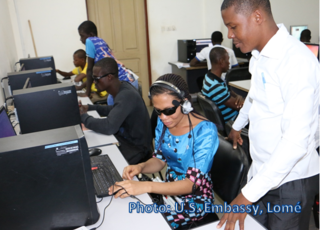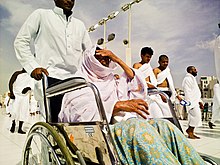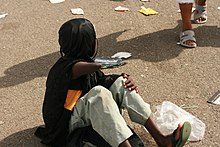
Disability is the experience of any condition that makes it more difficult for a person to do certain activities or have equitable access within a given society. Disabilities may be cognitive, developmental, intellectual, mental, physical, sensory, or a combination of multiple factors. Disabilities can be present from birth or can be acquired during a person's lifetime. Historically, disabilities have only been recognized based on a narrow set of criteria—however, disabilities are not binary and can be present in unique characteristics depending on the individual. A disability may be readily visible, or invisible in nature.
The disability rights movement is a global social movement that seeks to secure equal opportunities and equal rights for all people with disabilities.
People with disabilities in the United States are a significant minority group, making up a fifth of the overall population and over half of Americans older than eighty. There is a complex history underlying the U.S. and its relationship with its disabled population, with great progress being made in the last century to improve the livelihood of disabled citizens through legislation providing protections and benefits. Most notably, the Americans with Disabilities Act is a comprehensive anti-discrimination policy that works to protect Americans with disabilities in public settings and the workplace.

Public education in Saudi Arabia—from primary education through college—is open to every Saudi citizen. Education is the second-largest sector of government spending in Saudi Arabia. Saudi Arabia spends 8.8% of its gross domestic product on education, which is nearly double the global average of 4.6%. Saudi Arabia is an Islamic country and therefore Islam is interwoven in every part of society, also in education. Islamic studies are part of the education system alongside scientific and social studies that vary from educational institution to another. Important goals of education in Saudi Arabia are to teach the students the economic, religious and social norms of the country. They also want to reduce the high illiteracy. The education system consists of 3 levels: primary education, intermediate education and secondary education.

Inclusion, in relation to persons with disabilities, is defined as including individuals with disabilities in everyday activities and ensuring they have access to resources and opportunities in ways that are similar to their non-disabled peers. Disability rights advocates define true inclusion as results-oriented, rather than focused merely on encouragement. To this end, communities, businesses, and other groups and organizations are considered inclusive if people with disabilities do not face barriers to participation and have equal access to opportunities and resources.
Ableism is discrimination and social prejudice against people with physical or mental disabilities. Ableism characterizes people as they are defined by their disabilities and it also classifies disabled people as people who are inferior to non-disabled people. On this basis, people are assigned or denied certain perceived abilities, skills, or character orientations.

The King Salman Center for Disability Research is a non-profit organization based in Riyadh, Saudi Arabia. It conducts and funds laboratory and field research on all aspects and ages of disability. Its aim is to improve the quality of life of all persons living with disabilities by promoting research that results in real-life changes and activities that help reduce the impact of disability.
Sultan bin Abdulaziz Al Saud Foundation is a non-profit charity organization in Saudi Arabia set up and funded by former Crown Prince Sultan in 1995. The foundation participates in projects ranging from large housing projects for the needy and the provision of medical care facilities in Saudi Arabia to the funding of scientific research.
The world's poor are significantly more likely to have or incur a disability within their lifetime compared to more financially privileged populations. The rate of disability within impoverished nations is notably higher than that found in more developed countries. Since the early 2010s there has been growing research in support of an association between disability and poverty and of a cycle by which poverty and disability are mutually reinforcing. Physical, cognitive, mental, emotional, sensory, or developmental impairments independently or in tandem with one another may increase one's likelihood of becoming impoverished, while living in poverty may increase one's potential of having or acquiring disability in some capacity.
The lifetime prevalence of domestic violence in Saudi Arabia is estimated to be between 20%-39% for women, depending on the region in which they live. A 2015 study found that 20% of women visiting primary care centers in Riyadh had experienced domestic violence in the past year.
The overall prevalence of people with disabilities is 4.52% of the population, i.e., 63.28 million, according to the ICMR's publication from the NFHS-5 survey 2019-21. India is a party to the United Nations Convention on the Rights of Persons with Disabilities. Legislation that affects people with disabilities in India includes the Rights of Persons with Disabilities Act, 2016, the Mental Health Care Act, 2017, the National Trust Act, 1999, and the Rehabilitation Council of India Act, 1992. People with disabilities in India are faced with negative social attitudes in the wider population.
The intersection of disability and religion concerns the manner in which disabled people are treated within religious communities, the religious texts of those religions, or the general input from religious discourse on matters relating to disability. Studies on the relationship between religion and disability vary widely, with some postulating the existence of ableism and others viewing religion as a primary medium through which to assist disabled people. Religious exhortation often prompts adherents to treat people with disabilities with deference, however when the disability constitutes a mental illness such an approach may be slanted with an acknowledgement of the latter's naivete. In religions with an eschatological belief in divine judgment, there are often traditions promulgating an exemption from judgement in the afterlife for mentally disabled people, as well as for children who die before reaching maturity due to both lacking an understanding of their actions in a manner analogous to the insanity defense. Regarding the rationale behind God's creation of disabled people, some religions maintain that their contrast with the non-disabled permits the non-disabled to reflect and God to subsequently assess the level of gratitude shown by each individual for their health.

Disability in Yemen has been increasing over time, especially because of increased conflict in the area. Disabled people in Yemen face many challenges due to poverty, lack of accessible infrastructure, gender segregation and more. The government of Yemen has passed laws to help protect the rights of disabled people in their country, but not all laws are equally enforced.
Women with disabilities have the same health issues as any other women, such as the need for routine breast and cervical cancer screening. However, women with impaired mobility are often not given basic tests, such as weight monitoring, due to the lack of accessible equipment.

Singapore does not have a formal definition of disability. Singapore signed on to the Convention on the Rights of Persons with Disabilities in 2013 and coordinates the Enabling Masterplan with both government and non governmental organisations.

People with disability in Zambia face many unique challenges. The country has been passing laws and policies to help people with disabilities in Zambia, however, social stigma and other factors sometimes interfere in people being able to access services and assistance. In addition, the HIV epidemic in Zambia also has a significant impact on the lives of people with disabilities.

People with disabilities in Togo face many unique challenges. Disability in Togo is often seen as a curse or sign of witchcraft, leading to poor outcomes for people with disabilities. Accessibility in the country is lacking. However, Togo has signed onto the UN Convention on the Rights of Persons with Disabilities and has created plans to encourage greater inclusion for people with disabilities in the country.

There are around 447,600 people with disability in Cuba. A large number of people with disabilities in Cuba have an intellectual disability and about 3.2 percent have a severe disability. The government of Cuba has a medical model of disability in its approach to policies on people with disabilities. Another unique challenge that people with disabilities in the country face is due to the economic embargo of Cuba which has caused shortages in medical materials and assistive technology. The Constitution of Cuba has provisions for protecting the rights of people with disabilities and the country signed onto the Convention on the Rights of Persons with Disabilities in 2007.
Around 35,000 people in Belize have a disability. There are efforts to raise awareness about people with disabilities in Belize and counter social stigma. Several non-governmental organizations, including Special Olympics, help increase awareness and the government sponsors an annual Disability Week. Services for people with disabilities is limited and most areas of the country have limited accessibility.











